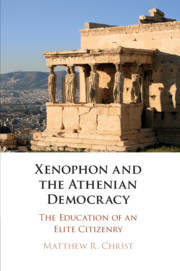Book contents
- Xenophon and the Athenian Democracy
- Xenophon and the Athenian Democracy
- Copyright page
- Dedication
- Contents
- Acknowledgments
- Introduction
- Chapter 1 Athens in Crisis in the Hellenica
- Chapter 2 Politics and the Gentleman in the Memorabilia
- Chapter 3 Work, Money, and the Gentleman in the Oeconomicus
- Chapter 4 The Education of Callias in the Symposium
- Chapter 5 Xenophon as Expert, Advisor, and Reformer in the Hipparchicus and Poroi
- Chapter 6 Xenophon the Democratic Orator
- Conclusions
- Bibliography
- Index of Ancient Citations
- General Index
Chapter 5 - Xenophon as Expert, Advisor, and Reformer in the Hipparchicus and Poroi
Published online by Cambridge University Press: 28 August 2020
- Xenophon and the Athenian Democracy
- Xenophon and the Athenian Democracy
- Copyright page
- Dedication
- Contents
- Acknowledgments
- Introduction
- Chapter 1 Athens in Crisis in the Hellenica
- Chapter 2 Politics and the Gentleman in the Memorabilia
- Chapter 3 Work, Money, and the Gentleman in the Oeconomicus
- Chapter 4 The Education of Callias in the Symposium
- Chapter 5 Xenophon as Expert, Advisor, and Reformer in the Hipparchicus and Poroi
- Chapter 6 Xenophon the Democratic Orator
- Conclusions
- Bibliography
- Index of Ancient Citations
- General Index
Summary
If Xenophon employs Socrates’ conversations with elite Athenians as a vehicle for communicating with his reading audience concerning their responsibilities within the democracy, he adopts a more direct approach to this in his Hipparchicus and his Poroi, where he addresses his readers in his own voice as an expert who can help them succeed in specific leadership roles. Xenophon’s advice in Hipparchicus concerns how a cavalry commander can best carry out this important elected office. His ideal cavalry commander is an astute political actor who carefully and self-consciously manages his relations with individuals, the Council, and the public at large; and while he seeks to carry out his duties in keeping with existing democratic institutions and rules, he also works to modify these when this will benefit the city. The chapter then turns to the Poroi, written soon after Athens’ disastrous Social War (357–355 BC) in which Xenophon outlines an ambitious program of financial reform for the city and in so doing models for his elite reader how a public speaker could go about persuading the Athenian Assembly to embrace changes to improve the situation of Athenians at home and abroad.
- Type
- Chapter
- Information
- Xenophon and the Athenian DemocracyThe Education of an Elite Citizenry, pp. 126 - 152Publisher: Cambridge University PressPrint publication year: 2020

